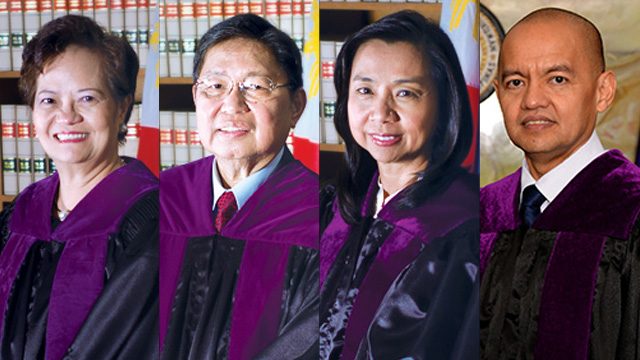SUMMARY
This is AI generated summarization, which may have errors. For context, always refer to the full article.

MANILA, Philippines – Four Supreme Court justices dissented with the majority opinion that dismissed petitions questioning the constitutionality of the Enhanced Defense Cooperation Agreement (EDCA).
Of the 4 dissenting magistrates, 3 came out with separate opinions – Teresita Leonardo-De Castro, Arturo Brion, and Marvic Leonen. Associate Justice Estela Perlas-Bernabe merely said she was joining the dissenting opinions. The lengthiest opinion came from Brion, with 65 pages, followed by Leonen’s 58, and De Castro’s 28.
The 3 opinions were one in saying that because EDCA has a far wider scope than earlier treaties like the 1951 Mutual Defense Treaty (MDT) and the 1998 Visiting Forces Agreement (VFA), it should be ratified by the Senate, as provided for in the Constitution.
Section 25, Article VXIII of the Constitution bans foreign military bases, troops, or facilities in the Philippines “except under a treaty duly concurred in by the Senate and, when the Congress so requires, ratified by a majority of the votes cast by the people in a national referendum held for that purpose, and recognized as a treaty by the other contracting State.”
Beyond VFA
Arguing that EDCA, which was signed on April 28, 2014, is not a mere implementing agreement of the MDT or the VFA, Leonen said it “substantially modifies and amends the VFA” in at least the following aspects:
- It allows the temporary stationing on a rotational basis of US military personnel and their contractors on physical locations with permanent facilities and pre-positioned military materiel.
- It allows pre-positioning of military materiel, which can include various types of warships, fighter planes, bombers, land and amphibious vehicles, and their corresponding ammunition.
- It contemplates the entry of troops for various training exercises and allows our territory to be used by the US to launch military and paramilitary operations conducted in other states.
- It introduces new concepts not contemplated in the VFA: agreed locations, contractors, pre-positioning of military materiel, and operational control.
- It contains provisions that may affect various statutes including, among others, the jurisdiction of courts, local autonomy, and taxation.
De Castro also pointed out that under EDCA, US forces and contractors are permitted to stay in “agreed locations” to undertake military activities “without any clear limitation as to the duration of their stay.” In addition, they are given “unimpeded access” to these locations to conduct activities that were not contemplated under the VFA.
She said in her opinion that EDCA is “entirely a new treaty, separate and distinct from the VFA and the MDT.” It appears to be the “general framework” for access and use of the agreed locations by American forces and contractors “rather than an implementing instrument of both the MDT and the VFA.”
Limits to presidential powers
For his part, Brion pointed out that while the majority opinion holds that the President’s power and duty “to ensure the faithful execution of our laws include the defense of our country” as commander-in-chief, he cannot “by himself, usurp the prerogatives of a co-equal branch” to carry out what is necessary for the defense interests of the country.
Senate concurrence on EDCA is part of what he termed as “democratic safeguards that place the responsibility over national policy beyond the hands of a single official.”
Without that concurrence, EDCA is “constitutionally deficient” and cannot be enforced. As a remedy, Brion recommended that the Court give the President 90 days from the service of its Decision – whether or not a motion for reconsideration is filed – the option to refer EDCA to the Senate for its consideration and concurrence.
Lessons of history
Leonen lamented, “Our collective memories are perilously short. Our sense of history is wanting.” Although the MDT and the VFA were in effect when China transgressed Philippine territorial waters, “The Americans did not come to our aid.”
Despite hosting US bases for decades, the Philippine Armed Forces remains ill-equipped. No US-made fighter jet exists in the Philippine Air Force, and the country is without a credible missile defense. “Our country’s most powerful assets now include a destroyer that was decommissioned as a United States Coast Guard destroyer in the 1960s,” he said.
The majority decision, according to Leonen, “darkens the colors of what is left of our sovereignty as defined in our Constitution. The majority’s take is the aftermath of squandered opportunity. We surrender to the dual narrative of expediency and a hegemonic view of the world from the eyes of a single superpower.”
De Castro ended her opinion, writing, “While it is true that the Philippines cannot stand alone and will need friends within and beyond this region of the world, still we cannot offend our Constitution and bargain away our sovereignty.”
The High Court voted 10-4-1 to dismiss questions of constitutionality.
Read the full dissenting opinions below.
De Castro’s concurring and dissenting opinion: 28 pages
Leonen’s dissenting opinion: 58 pages
Brion’s dissenting opinion: 65 pages
– Chay Hofileña / Rappler.com
Add a comment
How does this make you feel?
There are no comments yet. Add your comment to start the conversation.